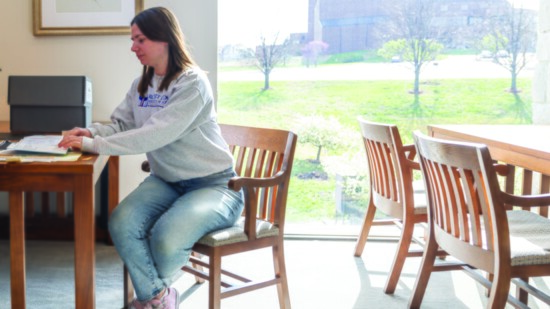University of Kansas History and Journalism student Alexandra Haggar has curated "ERA in the Heartland," a new exhibit in the Elizabeth Dole Gallery and Reading Room at The Dole Institute of Politics. It is based on her honors thesis, "Rescind ERA: The Failed Efforts in Kansas to Rescind Ratification of the Equal Rights Amendment, 1973-1980." This display will take visitors back to the early 1970s and is part of the Institute's efforts to highlight work from KU students.
Haggar's interest in the topic was sparked by a project she did as a Nebraska high school student. She was intrigued by her home state being the first to rescind its approval. "Then, when I started writing my thesis, I wanted to incorporate that aspect of it, but I also knew we have a lot of archives here on campus at the Dole Institute and the [Kenneth Spencer Research Library.] So, I ended up narrowing in on Kansas," she says.
Sarah Gard, Senior Archivist and Head of Collections at the Institute, helped Haggar gather the items for the exhibit from the Dole archives and other sources. She explains, "From an archivist’s perspective, studying the ERA is gaining in popularity. We just recently had the 100th anniversary of women’s suffrage, and there are more scholars coming to do work in our collections on the 1970s.”
Here's a refresher on the ERA: First proposed to Congress in 1923, three years after women obtained the right to vote, the amendment notes, "…equality of rights under the law shall not be denied or abridged by the United States or by any State on account of sex."
The amendment passed both houses of Congress in 1972 but failed to obtain the requisite 38 state ratifications by Congress' deadline of June 30, 1982. However, in January 2020, Virginia became the 38th state to ratify the ERA. On the flip side, five states--Nebraska, Tennessee, Idaho, Kentucky, and South Dakota—have since voted to rescind their ratifications. So now the amendment's future is in the hands of the courts.
The Dole Institute is home to the career papers of Senators Bob and Elizabeth Dole. While Haggar used collections from all over the Midwest for her research, the exhibit features Senator Bob Dole's press releases in support of the ERA and letters and information from constituents and organizations lobbying their positions.
"You can see the process a member of Congress goes through to educate themselves on an issue," Gard says.
Haggar continues, "Senator Dole supported the amendment the whole time, and you see this from a lot of the papers in the archives. He believed Kansas had a strong history with women's rights and that this amendment would strengthen that."
Though Kansas did ratify the ERA, Haggar's research also shows a lot of pushback in Kansas against it. From 1973 to 1980, there were consistent attempts to rescind the state's ratification. She notes a lot of the backlash came from women, which is why it was successful in other states.
"It wasn't just men saying, 'No, you should stay home,'" Haggar says. "It was women saying we want a say in how things are. A lot of these women weren't involved in politics before, but this mobilized them. A lot of them thought they wouldn't be allowed to be homemakers. They thought the amendment would require them to go out and provide fifty percent of their household income. That's how they interpreted it. It's interesting to see how they had these different interpretations and how these arguments spread. I think it's very important to highlight these local voices."
“ERA in the Heartland” can be viewed in the Elizabeth Dole Gallery and Reading Room during the Dole Institute’s visiting hours Tuesday through Sunday, 12 p.m. to 4 p.m. To learn more about this exhibit, visit the Dole Institute’s website, DoleInstitute.org.
